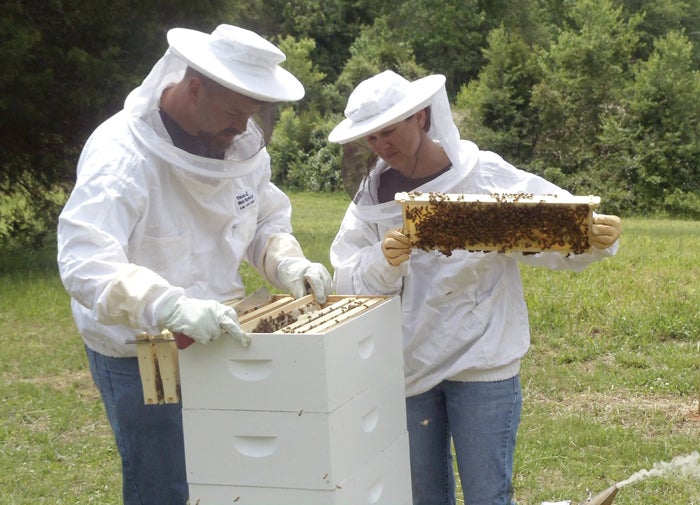All about the bees (not birds) Beekeeping School offered in 2019
Published 12:00 am Friday, November 16, 2018

- Submitted photo Beekeepers Jennifer and Ben Rosecrans. A Beekeepers School will be offered in January.
By Amy-Lynn Albertson
Rowan County Extension Director
The benefits of keeping bees are plentiful. The first things that most people think of are the rewards of harvesting your honey and the positive impact the increased pollination will have on your garden.
Fresh honey not only tastes great, but also can be beneficial to those with allergies. The theory is that since the bees are collecting pollen where you live, eating the small amounts of pollen present in local honey can immunize the body against the pollen so there is minimal irritation during allergy season. Many former allergy sufferers swear by it.
However, did you know that honey also has a variety of other uses? Honey, with its anti-bacterial and anti-microbial properties, is being studied as wound treatment, especially for burns, and it has also been used for centuries as a skin and hair beautifier in recipes for face masks, shampoos and bath oils. Bees create a variety of other substances, including propolis, bee pollen and royal jelly.
Propolis is made from the sticky resin found on trees. This substance is used to “caulk” cracks in the hive to keep out wind and rain, make entrances smaller or attach comb to the side of the colony.
Royal jelly is a honey bee secretion that is used to nourish the larvae and the adult queens in the hive. It has powerful anti-bacterial properties. Bee pollen is a ball or pellet of field-gathered flower pollen packed by worker honeybees and used as the primary food source for the hive. Bee pollen is touted by many to be one of the complete foods available, with a wide range of nutrients including polyphenols, enzymes, beneficial fatty acids, free amino acids, vitamin complexes, chelated minerals and trace elements.
Whether you have a flower garden or grow vegetables and fruits, honey bee pollination will make a huge difference. Flowers and plants will be much more vigorous, and fruit and vegetable yields will increase dramatically.
Not only do honeybees have an enormous positive impact on your garden, but their nectar-gathering range allows them also to pollinate an extended area. This pollination helps the ecosystem remain diverse and sustainable.
The Rowan County Beekeepers Association will offer a Beginner’s Beekeeping School Jan. 15- March 26, 2019. The cost for the school is only $75 per person. This fee includes a beginner beekeeping book, hands-on workshop, experienced journeyman and master beekeeper speakers, weekly prize drawings, and your first-year membership to RCBA.
Class size is limited to the first 60 paid participants. To register, bring or mail your registration form and checks only (payable to RCBA) to N.C. Cooperative Extension, Rowan County Center, 2727-A Old Concord Road, Salisbury NC 28146. Registration forms are available online at http://www.rowan.ces.ncsu.edu or call the office 704-216-8970, and we can mail you one.


